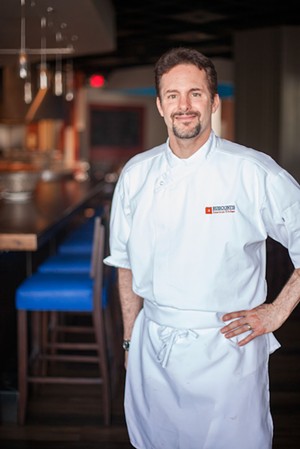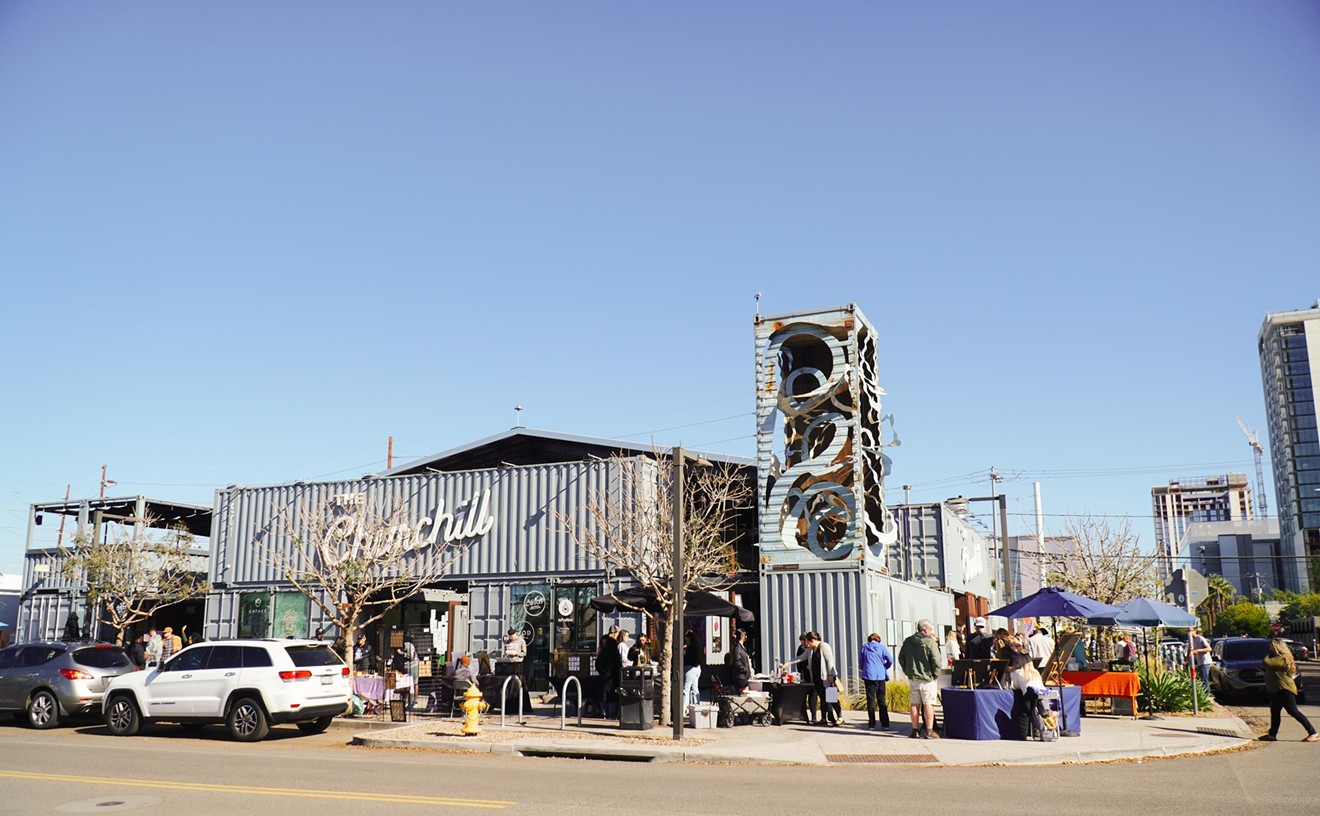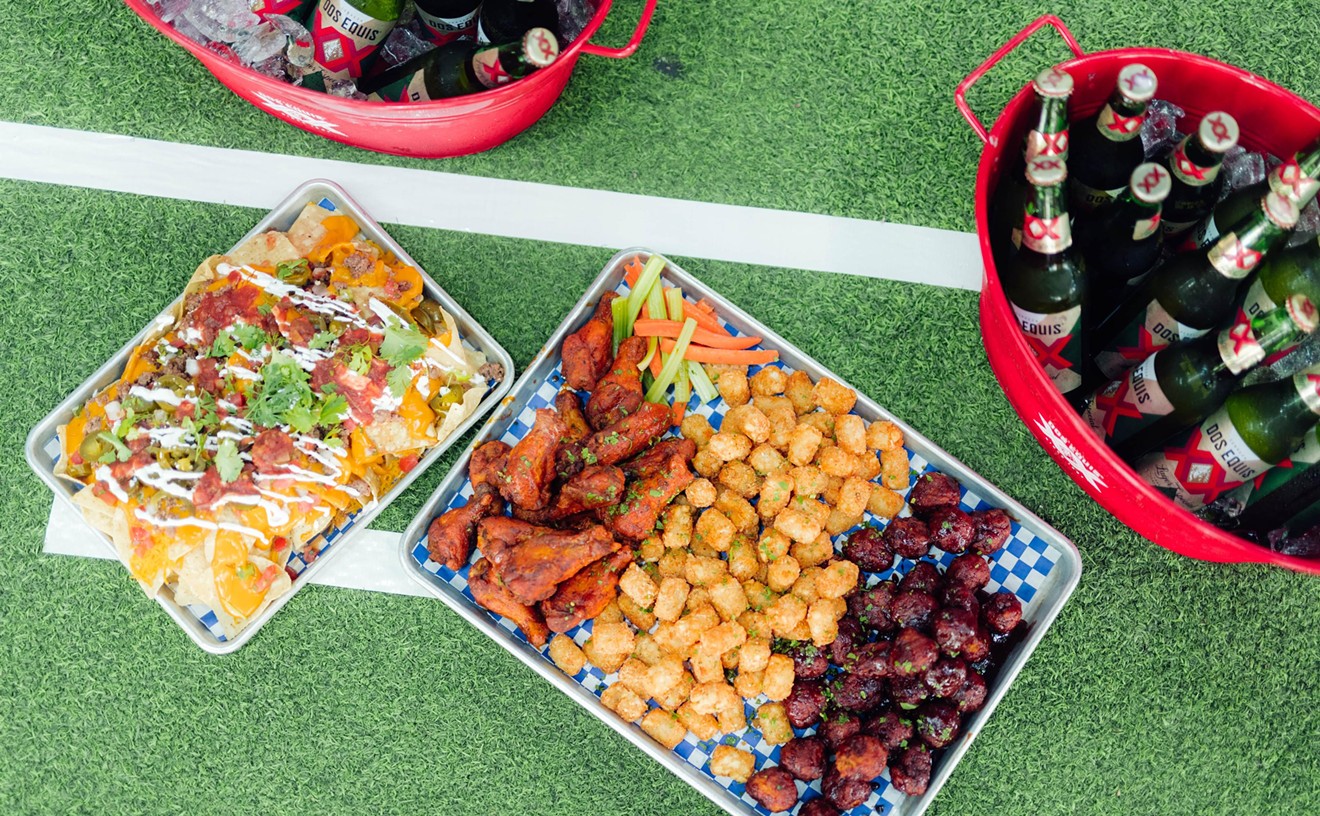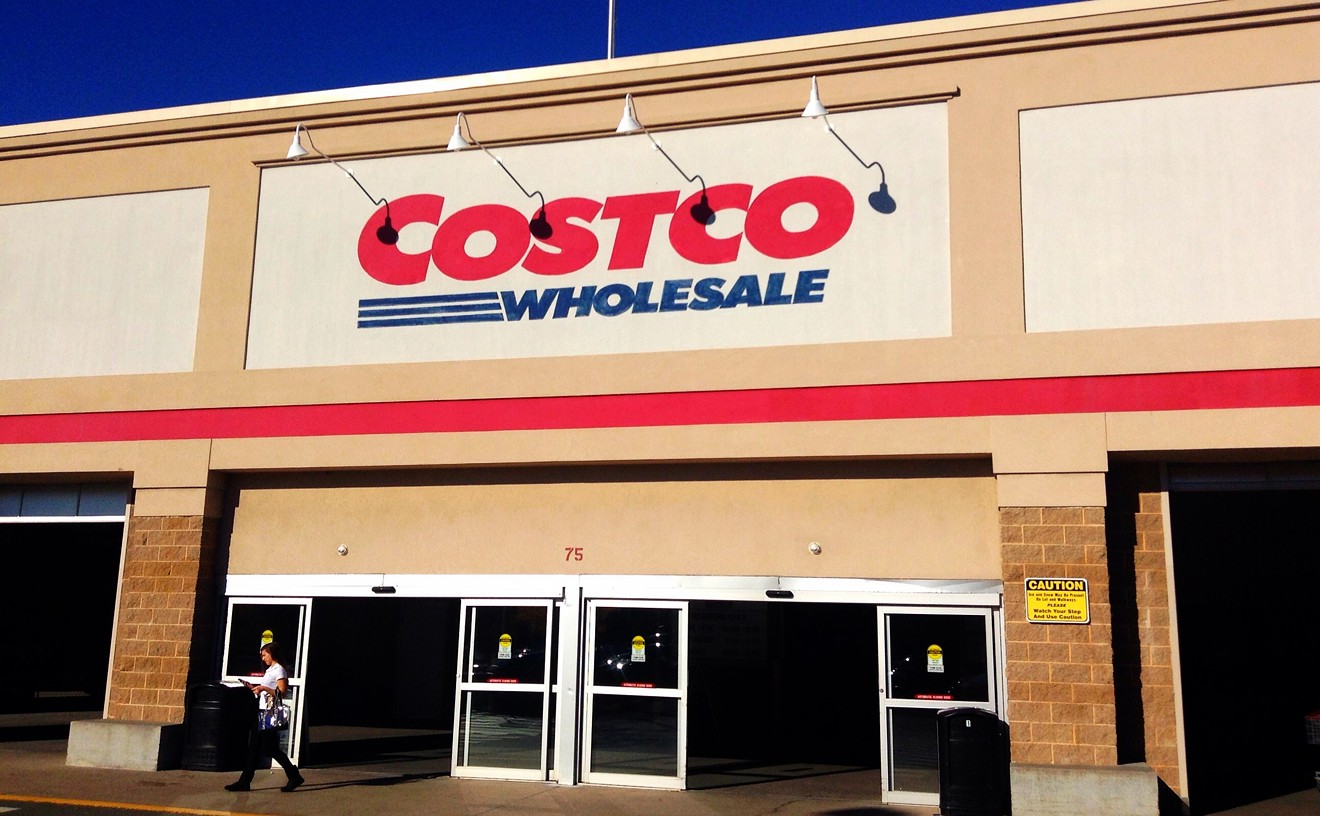He counters the COVID narrative with a tale of his own — of a waiter who just stopped working one recent night.
"He said to me, 'Chef, please lay me off. I can make more money on unemployment. I don't want to work.' So I fired him. Which didn't fix anything, on my end. It just proved that people don't want to work."
Those viral memes of café signs reading "We're short-staffed, please be nice to your server, no one wants to work anymore!"? They aren't faked-up. They're a real-life memento of a nationwide industry crisis, one that's keeping local restaurants from returning to full service. The culprit, according to many in the hospitality industry here in the Phoenix area, is super-attractive unemployment incentives that pay restaurant workers more than they'd make washing dishes or schlepping plates of shrimp scampi.
It's a national labor problem that stretches from Tehachapi to Tonawanda. When restaurants closed their doors last spring, many sent workers packing. According to the Bureau of Labor Statistics, restaurants and bars lost more than 5 million jobs from March to April last year. And while some food service personnel are jonesing to take your order, the National Restaurant Association reports that barely half of them have returned to work. A March survey of restaurants and fast-food joints by the National Federation of Independent Business found that 42 percent had job openings they couldn't fill. A McDonald's in Tampa, Florida, made headlines after offering $50 just to come in for an interview. In Maryland, hospitality trade organizations begged the secretary of labor to hasten unemployment restrictions.
And it's not just waiters and line cooks who aren't clocking in much these days. Employees of businesses that cater to restaurants — food processing plant workers and produce distributors and truck drivers — are also staying home, earning more to binge-watch The Handmaid's Tale than they would make on the job.
That means our favorite restaurants are open less, understaffed, or offering subpar service — because subpar employees are largely who's been showing up for interviews (if they show up at all). It means local diners and cafes, already gutted by pandemic shut-downs, are paying bonuses, increasing menu prices, losing money to overtime payouts, and pissing off customers who want the pandemic behind them and their steak frites on the table in front of them, pronto.
"I'm in the minority," says Miracle Mile Deli vice president Josh Garcia, whose iconic diner just celebrated its 72nd anniversary. "I've got a pair of head chefs and a waitstaff who've been loyal, hard workers during this difficult time. But a lot of restaurant owners don't have it so good."
So, chefs and café VPs and franchise owners are blaming the slowdown on shiftless workers. That's one narrative. But some hospitality workers argue they were never paid enough in the first place, so why come back at all?
A woman who says to call her Tina is sitting on her sofa. "This is where I work now," she says, patting the nubby cushion beside her. "I look at it like this: The government says it's okay to stay home, and they'll pay me more than I made praying for tips six nights a week. I earned this. Okay?"
Tina sees her time off as a federally sanctioned vacation. She told the manager of the Scottsdale steakhouse where she toiled for three years that she'd be back when her unemployment checks stopped coming. "He told me not to bother," Tina sniffs, tucking a strand of hair behind her ear. "But I guess the joke is on him because now no one wants to come back. I hear he's, like, barely open."
The service industry's crummy standards are no secret. Long hours, hard work, and lousy pay (the state minimum wage is $9 and change) are the norm; few restaurants offer benefits or paid vacation time.
"You're expected to smile and nod and tolerate bad behavior," says wage-rights activist and longtime restaurant worker Haley Holland. "It's an expectation of the job that you're going to constantly be rated by your customer and your boss and your co-workers. And you're supposed to do all this for a bullshit unlivable wage."
Recent pandemic shutdowns have simply given service workers a chance to really think about their rotten service industry jobs, Holland believes.
"Time for introspection is a luxury the working class rarely has," says Holland, who's the former organizer of One Fair Wage, an activist group devoted to improved working conditions in the service sector. "That's what capitalism and a 40-hour workweek are designed to do — keep you over-worked and underpaid and without the time to think about the conditions you're living under."
All that time at home has led to a collective class consciousness, Holland says. "Workers are saying, 'Fuck that job,' and they're leaving the service industry because it treats them like shit. They're finding ways to take care of themselves and earn a living making art or jewelry or doing graphic design. They're understanding they don't owe the government, and that the government should be paying them to stay home when it's unsafe to work."
It's an attitude that makes Tara Zagarski angry. "It's laziness, and it's embarrassing," she insists. Zagarski has been serving at Phoenix City Grille for six years and picked up extra shifts when less-loyal waiters like Tina began to bail.
"I'm a worker," she explains. "I won't take 20 dollars from my grandmother. And don't these lazy people see how staying home is going to hurt the restaurant industry?"
Holli Peters, a waitress at Scottsdale's S&V Urban Italian, doesn't think many servers care about the restaurant industry. "It's been kind of a hot mess here for a second," says Peters, who put herself through college waiting tables. "People ran off and left us here. They probably shouldn't be waiting tables, anyway."
Her boss agrees. "Pandemic unemployment turned people into selfish monsters," says S&V general manager Sheena Gamache. "We've had employees threaten to call the health department on us because they didn't want to work — they were willing to go that far. Those people aren't welcome back here."

S&V Urban Italian’s Holli Peters put herself through college serving: “People ran off and left us here. They probably shouldn’t be waiting tables, anyway.”
Tom Carlson
"When they do show up, I feel like I'm talking to the best of the worst," says Chef Micah Wyzlic of Phoenix City Grille. "Two years ago I wouldn't have given some of these people a first look."
Justin Erickson of Pork on a Fork BBQ has been stood up, too. He's trying to fill 40 positions for his new Chandler location, a food truck, and a catering company; a second food truck sits idle because Erickson can't find anyone to staff it.
The trouble mostly seems to be that federal unemployment incentives have been especially attractive to food service workers who traditionally earn less than they're getting to stay home. When the American Rescue Plan expanded unemployment benefits by $300 per week through September 6, that cinched the deal for many front- and back-of-the-house restaurant workers. Like Tina, they chose sitting on the sofa over up-selling surf and turf platters.
It hasn't helped owners and managers that, during the height of the pandemic and until very recently, those receiving unemployment weren't asked to prove they were looking for work, a longtime staple of unemployment payouts. Early this month, Governor Doug Ducey issued an executive order ending that largesse, as have nearly half the other states in the U.S. President Biden is pressing the Labor Department to make the remaining states follow suit.

Justin Ericson can’t find enough workers to staff his new Chandler Pork on a Fork or his second food truck.
Courtesy of Pork on a Fork
In the meantime, employers are scrambling to incentivize restaurant work. Miracle Mile's Garcia spotted a want ad offering a cash bonus to bussers who stayed on the job for 30 days. Zagarski's boss promised a gratuity to new hires; even then, she reports, only two servers took the bait.
"They're nice guys," Zagarski says. "But they've never served before. One of them worked at a pizza place for a while. Training them is going to take some time."
As they wait out the server shortage, local restaurateurs are punting. Wyzlic and his business partner, anxious to maintain their kitchen staff, paid full salaries during COVID shutdowns. On Mother's Day, he paid double time. Garcia's staff has taken extra shifts, even though paying overtime hurts his profit margins. Gamache says she's had her chef answering the phone and taking reservations. "Or I'll say to a line cook, 'Grab some plates and follow me.' I hope our guests see that we're doing whatever we can to serve them."
Rusconi, whose restaurant is open just five nights a week and for weekend brunches, is less hopeful.
"I'm scared to death," he admits. "If I lose another employee, I'll have to reduce my hours of operation. I don't want to do that, but my team is already over-worked."
He had an opportunity to open another restaurant recently. "But I didn't dare try. I'd be there with no servers, wondering if the food was going to show up."
Rusconi's referring to unemployment's impact on restaurant-adjacent businesses. Food-processing plants and produce distributors have also lost workers to the stay-at-home syndrome; delivery truck drivers, who make more not working, have also gone on the lam.
There were weeks when Gamache didn't receive her usual food order; others when her restaurant's liquor didn't arrive because there was no one to drive the booze distributor's truck.
"There's a trickle-down effect that's affecting everything we do," says Garcia, who before the pandemic never thought about where his pastrami was coming from.
"If you're a deli that sells two tons of pastrami a month, you might as well close your doors if you don't have pastrami," he says. "Twice this year we've nearly run out."
Wyzlic says this broken supply chain has led to higher demand and higher prices. Baby-back ribs for which he once paid $3.65 a pound now cost two dollars more. Garcia is paying his pastrami guy extra for overnight shipments. Rusconi has watched chicken and beef prices skyrocket; scallops, he says, have nearly doubled in price.
"I can't elevate my menu pricing that quickly," he says. "And I don't like to, anyway. I hate having to pass that on to my customer."
Yet staff shortages, wholesale price increases, shorter business hours, and increased overtime payments will mean more spendy spinach tortellini and pricier pot pies. Customers are beginning to notice, Wyzlic believes.
"People aren't being really gracious right now," he says. "And I get it. They've been shut up at home for a year and they want to get out and have a good meal. They don't know why we're short-staffed, or why the thing they always order isn't on the menu anymore. Do I have to put up a sign that says, 'Our staff is real tired, so be nice to them'?"
Being nice isn't enough, Tina says. "I can deal with pissy customers. The real problem here is that these guys never paid people what they're worth. We'd all be coming back to work in a jiffy if they made it worth our while."
Zagarski groans. "I hate that argument. It's just an excuse made by lazy people who don't want to work hard to earn good tips. If you don't like how waiting pays, don't do it. You're part of the problem."
Adapting during a crisis is the solution, says Garcia, whose grandfather opened the first Miracle Mile in 1949. "We could easily have folded last year. Instead, we changed." He's working now with a locally owned food distributor who can make quick deliveries and digging deep into his own pockets to keep his staff on the payroll.
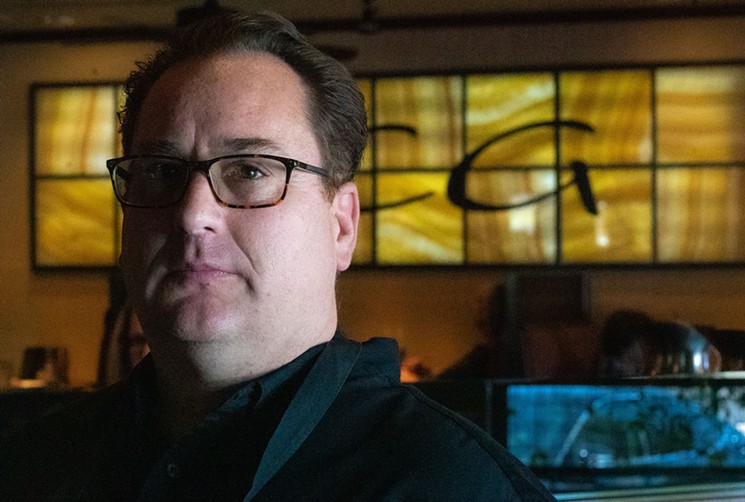
Chef Micah Wyzlic at Phoenix City Grille: “Do I have to put up a sign that says, ‘Our staff is real tired, so be nice to them’?”
Tom Carlson
"There's no such thing as 'business as usual' anymore," Garcia cautions. "Every day you walk in the door and ask, 'What's the challenge today?"
For Zagarski, part of that challenge is not being bitter. She admits she'd like the Tinas of the world, those people who bailed on her industry, to suffer some.
"These servers who brag about not working and collecting unemployment shouldn't be able to snap their fingers and get a job in a good restaurant," Zagarski says. "I want them to struggle a little bit first. And when they do, I am going to laugh at them."


